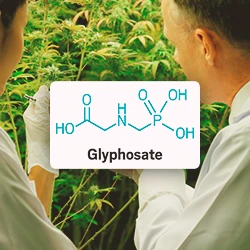You may be entitled to recover compensation, and our legal team can help. Please click the button below for a Free Consultation or call us toll-free 24 hrs/day for legal advice by dialing (866) 588-0600.
Glyphosate is a common chemical found in weed killers like Roundup that can be dangerous to humans if inhaled or ingested. This article will explore in depth how glyphosate-based herbicides cause DNA damage, as well as other effects that this chemical has on mammalian cells.
We have done hundreds of hours of research on glyphosate, its components, and how it causes DNA damage to human cells.
Table Of Contents
Quick Summary
- Glyphosate causes DNA damage through double-strand breaks in DNA.
- Glyphosate causes cell cycle dysregulation, which is the key to the production of cancer cells.
- Glyphosate has several adverse effects, including fever, headache, dizziness, and more.
- Glyphosate has been banned in over ten countries, and its use has been restricted in 15 countries.
What is Glyphosate?

Glyphosate is made up of an active ingredient acid, trimesium salt, diammonium salt, potassium and sodium salt, mono ammonium salt, and isopropylamine salt. It works by blocking certain enzymes that encourage plant growth.
Related Article: Glyphosate Lawsuit Update
How Does Glyphosate Cause DNA Methylation and DNA Damage?
Environmental exposure to glyphosate causes DNA damage by producing double-strand breaks in human lymphocytes. These breaks can lead to epigenetic alterations in chromosomes that cause non-Hodgkin lymphoma.
Glyphosate also produces changes in global DNA methylation and methylation-induced changes in specific genes. DNA methylation is a mechanism that controls the mRNA expression of genes and can increase the risk of developing human breast cancer cells and cause other cancers [2]. It also causes damage to peripheral blood mononuclear cells.
Human peripheral blood mononuclear cells are an important part of the immune system that help to fight off infections. When these cells are affected, there is a greater chance of disease induced by glyphosate.
How Glyphosate Affects Cell Cycle Regulation
Glyphosate affects the cell cycle by changing the DNA methylation of promoter regions on tumor suppressors, leading to glyphosate cancer development. The herbicide causes cell cycle checkpoints to fail, leading to cell cycle dysregulation, which is the key to developing tumor cells [3].
What Is a Double Strand Break?

Once those strands are broken, the links that were present between the two strands also tend to break apart. All these links are crucial to cell cycle regulation and serve as a roadmap to tell the human body what to do and how.
When a double-strand break occurs, many of those links can become separated from the strands and cause further DNA damage and breaks. Once these breaks occur, DNA repair is impossible.
Other Adverse Effects of Glyphosate
There are several other side effects of Glyphosate on human health besides DNA damage and epigenetic changes in DNA, which include:
- Liver and kidney damage leading to chronic kidney disease
- Eye irritation
- Skin irritation
- Increased saliva production
- Burns of the mouth and throat
- Vomiting
- Diarrhea
- Cancers
What Kind of Human Cancer Does Glyphosate Cause?
Glyphosate has been known to cause DNA damage-induced non-Hodgkin lymphoma, leukemia, B-cell lymphoma, kidney cancer, bone cancer, multiple myeloma, skin tumors, and pancreatic islet cell tumors.
Common Signs of Health Issues Caused by Glyphosate

- Fever
- Consistent fatigue
- Shortness of breath
- Unexplained weight loss
- Night sweats
- Abdominal pain
- Chest pain
- Trouble breathing
- Itchy skin
- Swollen lymph nodes in the armpit, groin, or neck
Symptoms of Glyphosate Exposure Poisoning
If you ingest glyphosate, many side effects occur, including:
- Headache
- Dizziness
- Coma
- Low blood pressure
- Weakness
- Abdominal cramps
- Diarrhea
- Mouth and throat irritation
- Blue fingers or lips
- Trouble breathing
- Nausea and vomiting
Glyphosate Toxicity Levels
The toxic nature of glyphosate is due to the added ingredients of surfactant and other chemical compounds present in the formula. Aminomethylphosphonic acid is the main ingredient in glyphosate that has been proven to cause neurological damage in humans [4].
Risk assessment has shown that high concentrations lead to a greater risk of toxicity [5]. No glyphosate treatment is available, and most treatment includes decontamination and supportive therapies.
Reasons for the Recall of Glyphosate

In a 2019 study and risk assessment, researchers determined that high exposure to glyphosate increased the risk of non-Hodgkin lymphoma by 41 percent [6]. Bayer vehemently denies that glyphosate causes cancer.
The Environmental Protection Agency (EPA) has also refused to pull the product from the market, despite the health issues it causes. Recently, the EPA reviewed Roundup and didn’t identify any health risks to humans from exposure but did list environmental toxicology concerns [7].
Glyphosate has been banned in over ten countries, including Mexico, Saudi Arabia, Vietnam, and Germany. At least 15 other countries have restricted the use of this chemical. This chemical should be banned because of its ability to cause cancers and other diseases.
“Contrary to the widely-held misconception that glyphosate is harmless to humans, available evidence shows that glyphosate may be the most important factor in the development of multiple chronic diseases and conditions that have become prevalent in Westernized societies.”
– Anthony Samsel, cellular biologist
What Is the Burden of Proof for a Roundup Claim?
If you have experienced health issues associated with Roundup, you may have a reason for a lawsuit against the company. Roundup may be liable for your illness or the death of a loved one from failure to warn customers of the product’s potential risks, which opens up a product liability lawsuit grounds.
To hold the company accountable, you will need to prove two key elements:
- First, you will need to prove a history of exposure to glyphosate or Roundup. Whether it was used in your workplace commercially or has had ten or more dose uses on your lawn.
- Second, you will need medical proof of a diagnosis of any of the cancers that glyphosate causes, including lymphoma or leukemia, or any other health issues that glyphosate may have caused.
Average Settlement of a Lawsuit
The average glyphosate lawsuit settles for $5,000 to $250,000. As of 2020, Bayer paid out a global settlement with thousands of plaintiffs and paid over $10 billion in compensation.
Factors Affecting the Amount Received From a Lawsuit

- Length of exposure: The more you were exposed, the stronger your case.
- Cancer diagnosis: Lymphoma from Glyphosate takes around two years to develop, so you will need to ensure that the exposure and when you were diagnosed fit into this time frame.
- Scientific data: Data to support that Glyphosate caused the illness.
- Having other health issues: Other health issues that could have led to your cancer, such as tobacco use, can decrease your chances of a successful lawsuit.
See all related toxic tort lawsuits our lawyers covered so far.
FAQs
1. What is glyphosate used for?
Glyphosate is an active ingredient in herbicides to control weeds and grasses. It works by preventing plant growth through enzyme restriction.
2. What happens if you inhale glyphosate?
Inhaling glyphosate can cause headache, dizziness, vomiting, abdominal pain, nausea, irritation of the nose and throat, and more.
3. Does glyphosate harm gut bacteria?
Glyphosate does harm gut bacteria. It has been found that 54 percent of 101 species of bacteria found in our guts can be damaged or killed if exposed to glyphosate in a high quantity [8].
4. How long does glyphosate stay in the body?
Glyphosate stays in the body for a few hours to a few days. It can be detected in the blood and urine.
Get a Free Lawsuit Evaluation with Our Lawyer
The Product Liability Litigation Group at Schmidt & Clark, LLP is an experienced team of lawyers that represent plaintiffs in Roundup lawsuits. We handle individuals’ litigations nationwide and investigate lawsuits for Roundup in all 50 states.
If you or a family member has developed lymphoma, another cancer, or other health issues after using or becoming exposed to Roundup, contact us immediately for a free lawsuit evaluation. You may have cause to file a Roundup lawsuit, and our law firm can help.
References:
- https://www.epa.gov/ingredients-used-pesticide-products/glyphosate
- https://www.nature.com/articles/npp2012112?error=cookies_not_supported&code=4ac9af06-bf93-44b8-bb92-def0e480678d?error=cookies_not_supported&code=4ac9af06-bf93-44b8-bb92-def0e480678d?error=cookies_not_supported&code=4ac9af06-bf93-44b8-bb92-def0e480678d
- https://www.sciencedirect.com/science/article/pii/S0887233319307969#:~:text=The%20conducted%20analysis%20have%20shown,BCl2%2C%20CCND1%20and%20P21).
- https://misuse.ncbi.nlm.nih.gov/error/abuse.shtml
- https://www.tandfonline.com/doi/full/10.1080/1547691X.2020.1804492
- https://www.sciencedirect.com/science/article/abs/pii/S1383574218300887
- https://www.epa.gov/pesticides/epa-withdraws-glyphosate-interim-decision
- https://www.forbes.com/sites/helenalbert/2020/11/25/glyphosate-exposure-could-disrupt-human-gut-microbiome/?sh=1f0c4710cf8a

 Published by
Published by